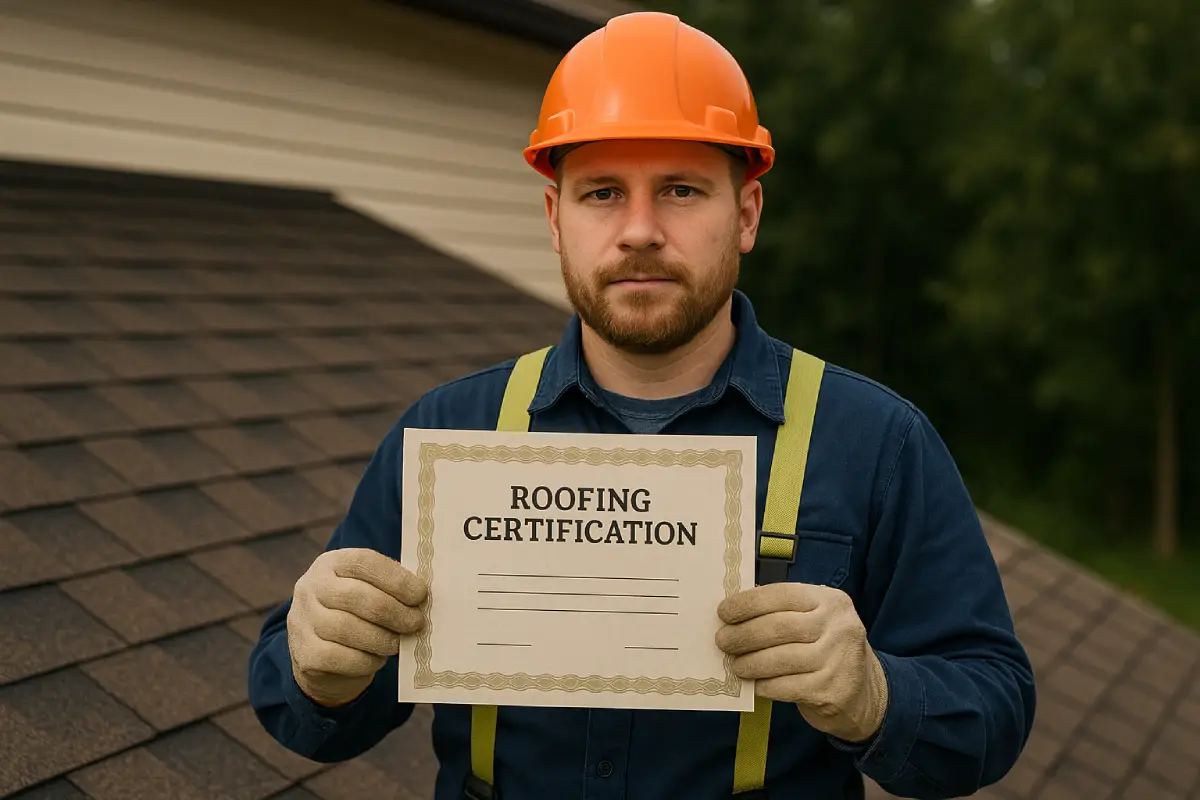Roofing is one of the most crucial components of any home or building. It protects the interior from environmental elements and contributes significantly to structural integrity and energy efficiency. With such importance, it’s no surprise that roofing installation and repair should be handled by qualified professionals.
One way to ensure that a roofer is competent and trustworthy is through roofing certification. Whether you’re a contractor seeking credibility or a homeowner looking to hire the right professional, understanding roofing certification is essential.
Roofing certification validates that a roofer has undergone specific training and meets the standards set by manufacturers, industry organizations, or state regulations. These certifications are not just decorative plaques—they offer assurance that the work will be done safely, correctly, and in compliance with building codes.
What Is Roofing Certification?
Roofing certification is an official credential issued by roofing product manufacturers, industry associations, or licensing bodies. It typically signifies that a contractor or roofer has demonstrated competence in using specific materials, tools, and techniques. Certifications often involve a combination of hands-on training, examinations, and continuing education.
There are various types of roofing certifications depending on region and material. For example, some programs focus on asphalt shingles, while others center on metal, tile, or flat roofing systems. Certification can also vary between general roofing and specialties like solar roofing or green roof installations.
Some of the most well-known certifications in the U.S. include:
- GAF Master Elite® Certification
- CertainTeed SELECT ShingleMaster™
- Owens Corning Preferred Contractor
- NRCA ProCertified®
Each of these programs sets strict requirements and offers different levels of recognition based on experience, training, and customer satisfaction.
Roofing Certification Class: Your Path to Professional Excellence
What to Expect from a Roofing Certification Class
If you’re a roofing contractor or an aspiring professional, enrolling in roofing certification classes is a great first step toward building your credentials. These classes are typically offered by manufacturers, trade schools, industry associations, and community colleges. The curriculum can range from basic roofing concepts to advanced installation techniques.
A typical roofing certification class covers:
- Roofing materials and product specifications
- Installation techniques for different roofing types (shingle, metal, flat, etc.)
- OSHA safety standards and fall protection
- Local building codes and permit requirements
- Leak detection and repair strategies
- Warranty registration and documentation
Some classes are one-day workshops, while others span several weeks and include hands-on training. At the end of the course, participants usually take an exam or complete a practical assessment. Passing the course results in a certificate that can be added to your resume or business profile.
Choosing the Right Program
Not all certification classes are created equal. When selecting a program, consider the following:
- Accreditation: Is it recognized by a reputable manufacturer or organization?
- Curriculum: Does it match your skill level and career goals?
- Instructor credentials: Are the instructors experienced industry professionals?
- Practical training: Does it offer hands-on installation practice?
- Post-course support: Will you have access to resources, updates, or job placement assistance?
Investing time and money in the right class can significantly enhance your career, whether you are starting out or seeking to specialize in a specific type of roofing.
Why Certification Matters for Contractors
For roofing professionals, certification offers credibility and competitive advantages. Certified roofers often:
- Gain access to better products and extended warranties from manufacturers
- Appear more trustworthy to potential clients
- Receive referrals from certification directories or manufacturer websites
- Stay updated on industry standards and installation techniques
In an industry where trust and reputation are everything, certification serves as a third-party endorsement of quality and reliability. It can also help contractors meet insurance requirements and avoid legal issues related to improper installation.
Why Homeowners Should Prioritize Certified Roofers
Hiring a certified roofer offers peace of mind for homeowners. Certification ensures that the roofer:
- Is properly trained to install the materials on your roof
- Follows industry best practices and safety protocols
- Can offer extended manufacturer warranties
- Is less likely to cut corners or deliver subpar work
Certified roofers are also more likely to be properly insured and licensed, reducing your liability in case of accidents or damages. Ultimately, hiring a certified contractor may cost slightly more upfront but can save you thousands in repairs and replacements down the line.
Conclusion
Roofing certification is more than just a title—it’s a marker of professionalism, skill, and commitment to excellence. For contractors, it opens doors to better jobs, improved client trust, and manufacturer backing. For homeowners, it provides assurance that the job will be done right the first time, with long-lasting results.
Whether you’re looking to hire a roofer or become one, understanding the value of certification and the training behind it is key. By investing in roofing certification or hiring a certified professional, you’re making a choice that protects both property and peace of mind.
